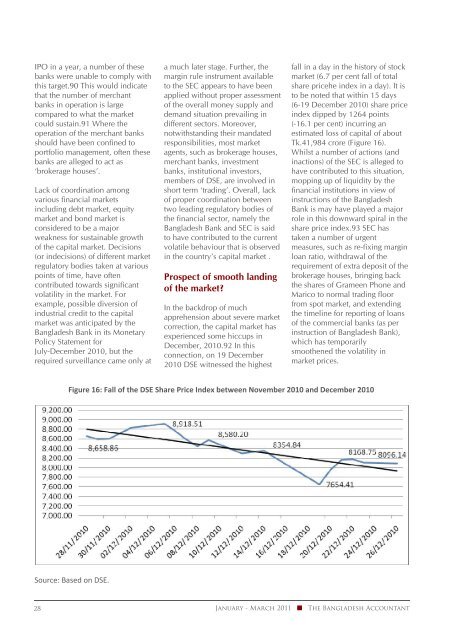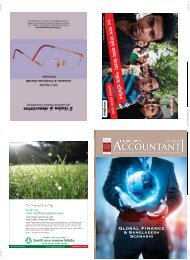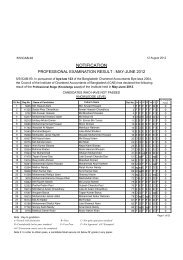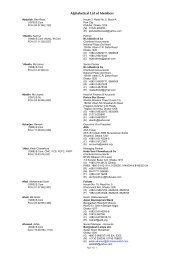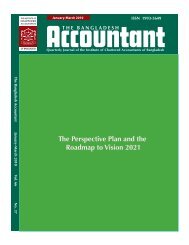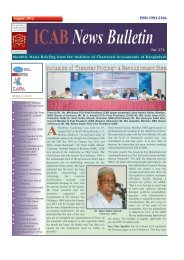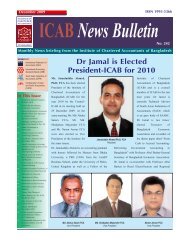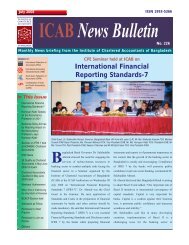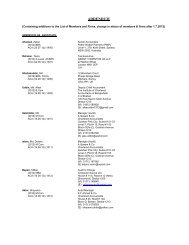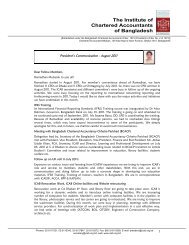Forma # 1.ai - ICAB
Forma # 1.ai - ICAB
Forma # 1.ai - ICAB
You also want an ePaper? Increase the reach of your titles
YUMPU automatically turns print PDFs into web optimized ePapers that Google loves.
IPO in a year, a number of these<br />
banks were unable to comply with<br />
this target.90 This would indicate<br />
that the number of merchant<br />
banks in operation is large<br />
compared to what the market<br />
could sustain.91 Where the<br />
operation of the merchant banks<br />
should have been confined to<br />
portfolio management, often these<br />
banks are alleged to act as<br />
‘brokerage houses’.<br />
Lack of coordination among<br />
various financial markets<br />
including debt market, equity<br />
market and bond market is<br />
considered to be a major<br />
weakness for sustainable growth<br />
of the capital market. Decisions<br />
(or indecisions) of different market<br />
regulatory bodies taken at various<br />
points of time, have often<br />
contributed towards significant<br />
volatility in the market. For<br />
example, possible diversion of<br />
industrial credit to the capital<br />
market was anticipated by the<br />
Bangladesh Bank in its Monetary<br />
Policy Statement for<br />
July‐December 2010, but the<br />
required surveillance came only at<br />
a much later stage. Further, the<br />
margin rule instrument available<br />
to the SEC appears to have been<br />
applied without proper assessment<br />
of the overall money supply and<br />
demand situation prevailing in<br />
different sectors. Moreover,<br />
notwithstanding their mandated<br />
responsibilities, most market<br />
agents, such as brokerage houses,<br />
merchant banks, investment<br />
banks, institutional investors,<br />
members of DSE, are involved in<br />
short term ‘trading’. Overall, lack<br />
of proper coordination between<br />
two leading regulatory bodies of<br />
the financial sector, namely the<br />
Bangladesh Bank and SEC is said<br />
to have contributed to the current<br />
volatile behaviour that is observed<br />
in the country’s capital market .<br />
Prospect of smooth landing<br />
of the market?<br />
In the backdrop of much<br />
apprehension about severe market<br />
correction, the capital market has<br />
experienced some hiccups in<br />
December, 2010.92 In this<br />
connection, on 19 December<br />
2010 DSE witnessed the highest<br />
fall in a day in the history of stock<br />
market (6.7 per cent fall of total<br />
share pricehe index in a day). It is<br />
to be noted that within 15 days<br />
(6‐19 December 2010) share price<br />
index dipped by 1264 points<br />
(‐16.1 per cent) incurring an<br />
estimated loss of capital of about<br />
Tk.41,984 crore (Figure 16).<br />
Whilst a number of actions (and<br />
inactions) of the SEC is alleged to<br />
have contributed to this situation,<br />
mopping up of liquidity by the<br />
financial institutions in view of<br />
instructions of the Bangladesh<br />
Bank is may have played a major<br />
role in this downward spiral in the<br />
share price index.93 SEC has<br />
taken a number of urgent<br />
measures, such as re‐fixing margin<br />
loan ratio, withdrawal of the<br />
requirement of extra deposit of the<br />
brokerage houses, bringing back<br />
the shares of Grameen Phone and<br />
Marico to normal trading floor<br />
from spot market, and extending<br />
the timeline for reporting of loans<br />
of the commercial banks (as per<br />
instruction of Bangladesh Bank),<br />
which has temporarily<br />
smoothened the volatility in<br />
market prices.<br />
Figure 16: Fall of the DSE Share Price Index between November 2010 and December 2010<br />
Source: Based on DSE.<br />
28<br />
January - March 2011<br />
The Bangladesh Accountant


